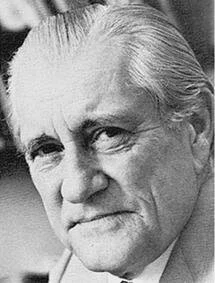It began with a chance (and joking) remark I heard over a card game: “There’s no justice in the world.” And all because I got dealt the better hand in a game of Canasta. If you’re looking for justice in the world, card games might not be your first stop.
Yet for some reason that truism, spoken in jest, awoke in me a distant association, bringing to mind the ringing phrase “Not so wild a dream.” Because, well, there isn’t nearly enough justice in the world, which is exactly why it’s not so wild a dream.
The original quotation was from the writer and screenwriter Norman Corwin, who said (in a noted radio essay called “On a Note of Triumph,” at the conclusion of World War II) that “brotherhood is not so wild a dream as those who profit by postponing it pretend.” But it came to me via the journalist Eric Sevareid, who used it as the title of his fascinating – if seemingly premature – 1946 autobiography.
Sevareid was just 34 years old when his 500-page memoir first appeared, recounting his youth and early years as a reporter for CBS News before and during World War II. It’s an amazingly thoughtful autobiographical and journalistic chronicle.
I hadn’t thought of the book in many years; but I had reviewed the second edition when it was issued in 1976, back when I was a freelance reviewer for the Quincy (MA) Patriot Ledger; and it left an impression. The story of Sevareid’s life to that point was thrilling; it almost made you wish you had been there.
From a distance of nearly fifty years, I still recall the stories of his childhood in the small town of Velva, North Dakota; his adventures as a teenager trekking with a friend in the Canadian wilderness; and starting out in journalism as World War II loomed. Later, he had to leave his wife, who was about to give birth to twins in in a hospital in soon-to-be-occupied Paris, when he was assigned to cover the war elsewhere, including in the CBI (China, Burma, India) theater. After that came his return to peacetime America, and his continued rise to journalistic stardom at CBS.
One can’t take much of anything seriously, or become a great reporter or storyteller, without being a moralist of some sort; and Sevareid was all of those things: a classic Midwestern progressive, a cosmopolitan democrat and anti-fascist, an astute observer. The ethical clarity in his writing evokes the political nonfiction of George Orwell, or in the gentler but equally penetrating moral intelligence of a Reinhold Niebuhr or a Primo Levi. Among Sevareid’s journalistic peers, in my estimation, only Edward R. Murrow was his equal.
Eventually, some even thought of him as a potential national leader. But in those days, politics was a serious profession in its own right (that’s just one of the ways our democracy has declined); and one didn’t just prance into it, least of all from journalism. Reporting was still widely considered an unserious, blue-collar profession, full of hacks at the lower echelons. But the best of them have always remembered Jefferson’s idea of the press as an essential part of the vital and ecosystem of democracy – along with higher learning.
Looking back now, Sevareid was probably something of a role model for me. I studied journalism and worked briefly as a reporter; but I was never going to be a career journalist, let alone a great one. I could never aspire to Sevareid’s gravity, his talent, or his silvery midwestern voice. But then, we don’t choose our heroes merely to imitate them, or to fancy ourselves their equals. (And hopefully we don’t view them uncritically.) We choose them, rather, as the kinds of people we wish we could be, and the ethical company we care to keep. If you have no such heroes, you are lonely.
Eric Sevareid and the other aforementioned writers are among the company I chose – and not always for their most popular works. In Orwell’s case, it was Homage to Catalonia that most impressed me; in Niebuhr, The Children of Light and the Children of Darkness; and in Levi, The Drowned and the Saved. The latter may be the best work of nonfiction I’ve ever read.
When I ultimately made my own small but satisfying mark, it was not as a daily journalist, or even as a book reviewer. But as a young man, admiring Sevareid was not a mistake. And the belief that justice is worth working for and hoping for, even in the grimmest of times, is not so wild a dream. Not even over a game of cards.

